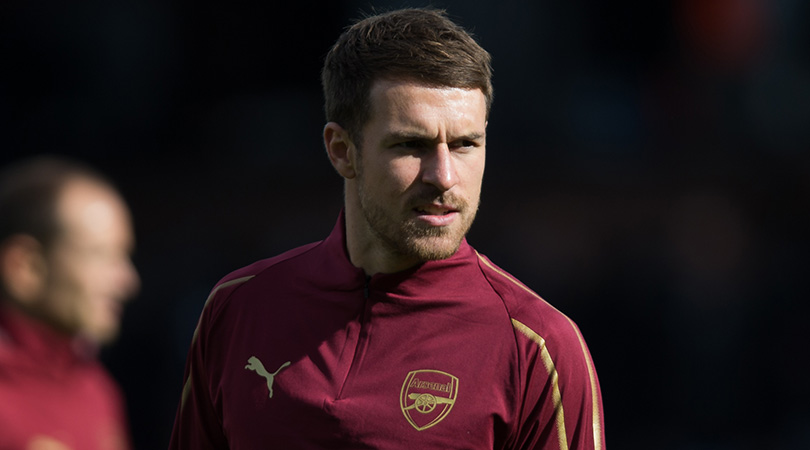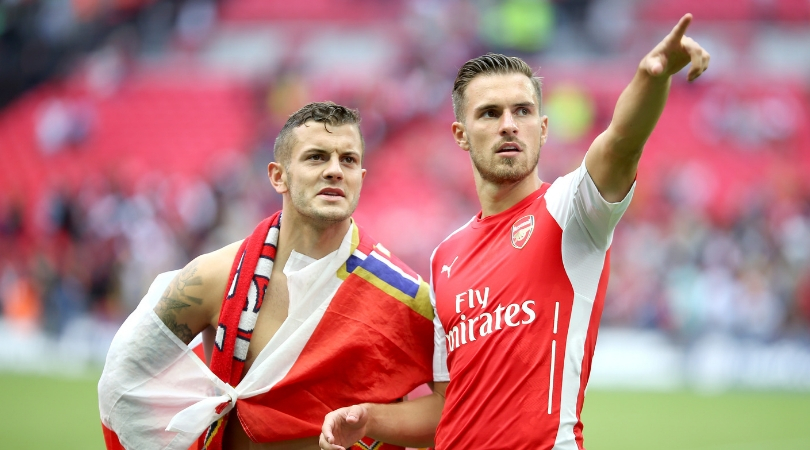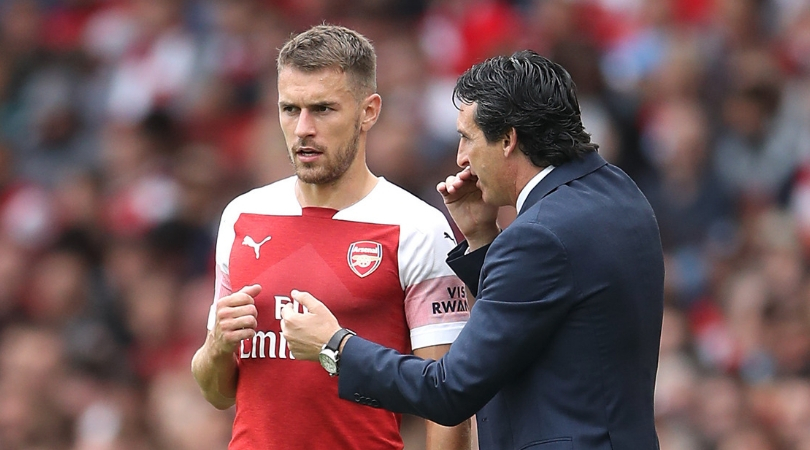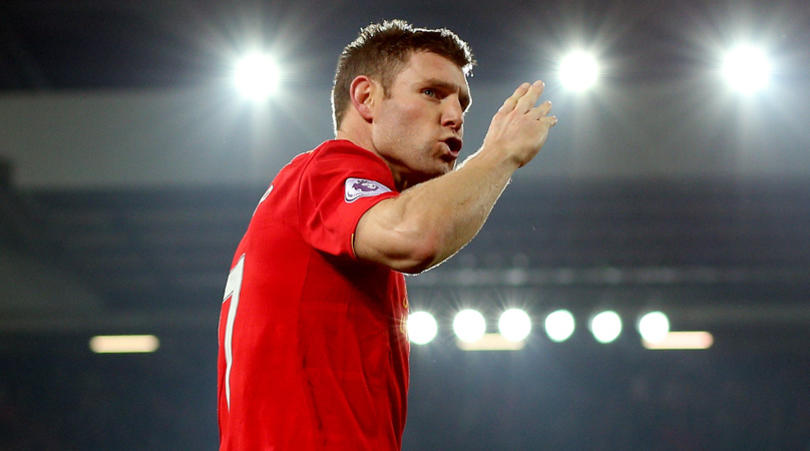Aaron Ramsey: the final piece to fall in Arsenal's botched British plan – but who's to blame?
The midfielder’s contract situation has been badly mismanaged and, as Nick Miller explains, the Gunners stand to lose yet another player they had hoped to build the team around

NEWS Ramsey contract situation 'closed', says Arsenal boss Emery
When Arsenal announced that five young British players had all simultaneously signed new contracts in 2012, you would have got some pretty long odds on Carl Jenkinson being the last man standing.
Jenkinson almost seemed an afterthought in the line-up which saw Jack Wilshere, Kieran Gibbs, Alex Oxlade-Chamberlain and Aaron Ramsey awkwardly pose, pens hovering over paperwork, Arsene Wenger proudly standing behind them like the parent in one of those local news stories about siblings who all got brilliant A level results.
“The plan is to build a team around a strong basis of young players,” said Wenger at the time. “I’m a strong believer in stability and I believe when you have a core of British players, it's always easier to keep them together and that's what we'll try to achieve going forward.”
Gibbs was the first to go, sold to West Brom in summer 2017 after losing his place to Nacho Monreal. A day later Oxlade-Chamberlain moved to Liverpool, less of a transfer more a reset; a player gone stale signing for a fresh, brighter club with new ideas where he flourished. Then Wilshere finally left permanently last summer, the 38 appearances he made last season a neat summary of why it was time for Wenger to depart; a man clinging on to a player he still thought was the future.
PSEUDONEWS Tottenham to test new stadium with pretend unexpected, costly defeat
New era
Get FourFourTwo Newsletter
The best features, fun and footballing quizzes, straight to your inbox every week.
And soon Ramsey will be gone, maybe in January, definitely by next summer unless a significant about-face in his contract negotiations arrives – something that doesn’t seem likely after Unai Emery confirmed the situation was set in stone this week. But in many ways, it would be pretty appropriate if things do change, because it would fit with the chaotic way that this whole situation has been handled.
A deal was offered. Ramsey seemed pretty happy with the offer. That offer was withdrawn, occurring a few weeks after the end of the transfer window, meaning Arsenal will either get nothing or a significantly reduced fee for a player in the theoretical prime of his career that they have nurtured and developed for a decade.
So is this a heroic bungle or the unfortunate consequence of changing regimes, a player falling between the cracks while other things were sorted out? Ramsey’s deal was clearly a few items down on the 2018 to-do list, behind sorting out Mesut Ozil’s future, restructuring the way the club was run, recruiting the club’s first new manager in 22 years and dealing with the departure of a chief executive.

Reports indicate that the latter factor was key: Ivan Gazidis had been more than happy to give Ramsey his new deal, but when the chief executive's departure for Milan was announced in September, the new decision-makers concluded that they could do without the midfielder.
Those decision-makers reportedly included Emery, but if he was a big part of the call, that suggests further confusion: the point of having a head coach rather than a manager is that long-term decisions aren’t based on the whims of a theoretically transient figure. The new structure at Arsenal is designed to stop exactly this, someone deciding they can do without a valuable player after working with him for a couple of months.
Perhaps you could blame the previous regime for not tying Ramsey down earlier, but the new men still had the chance to be decisive.
“I do believe that a player’s contract should never go to the last year, as a policy,” Raul Sanllehi, Arsenal director of football, said in October. “But I don’t think I am inventing the wheel. Anybody could agree on that. Normally the contracts of the players are for five years. You need to have a clear idea of what you want to do with that player when he is in the third year, at the latest.”
Sanllehi arrived at the club in February, leaving plenty of time to either sign Ramsey up or sell him. As it is they are left with this unsatisfactory halfway house, having neither the player nor meaningful compensation.
Part to play
Ramsey's significance as a part of Arsenal’s squad was emphasised in Sunday's North London derby win over Tottenham. He came off the bench, played as a No.10, set up two goals and generally changed the game. Even if Emery doesn’t regard him as an automatic starter, in these days when managers don’t really have first XIs but must have strong and flexible squads, this was proof that he’s still extremely valuable – at the moment, certainly more than Ozil, whose relationship with Emery seems to now be dust.
Perhaps Ramsey was asking for too much money. If so, why were they initially prepared to offer at least something close to what he wanted? That can’t only be explained by the departure of Gazidis.
“We all know that the contract was taken off the table,” said Ramsey a few weeks ago. “I’m not sure exactly why because a few weeks before we sort of agreed and I was ready to sign.”
One always has to be wary of a player trying to ensure he isn’t painted as the bad guy, but it certainly sounds as if he was broadly happy with the terms on offer.

In any case, the Welshman will have to be replaced, which represents a fairly significant gamble. Arsenal are waving away a proven, reliable player, and in his stead will almost certainly have to be either someone untried or someone expensive. Possibly both. Wage structures are sensible, but this feels like a false economy.
All of which is before you consider where Ramsey might go. If he stays in England, his choices are limited: he’s not good enough for Manchester City, there isn’t room for him at Liverpool, and Chelsea have a long queue of central midfielders already. The most logical landing spot for him from a football perspective is Tottenham, which isn’t a particularly edifying idea for any Arsenal fan.
They might be saved such indignity by Ramsey’s own preferences (“No,” was his pithy answer when asked if they were a possible destination) and Spurs essentially becoming Arsenal c.2008: a talented team financially hamstrung by paying for a new stadium.
Which leaves Manchester United. This is a different time to 2012 when Robin van Persie moved north, but the prospect of losing another beloved player to United is not one to be relished. From a saving face point of view, Arsenal must be praying Ramsey moves abroad.
Who knows who is truly to blame for all of this. Gazidis’s mismanagement of Arsenal’s contracts isn’t confined to Ramsey, and has potentially cost the club millions in transfer fees. The new regime should have been more decisive over his future, and the first significant post-Gazidis decision about an existing player has been questionable at best.
What is certain is that the British core Arsenal thought they were building around was allowed to fester, not achieve their potential and eventually leave. Ramsey is just the latest example.
But at least they’ve still got Carl Jenkinson.

